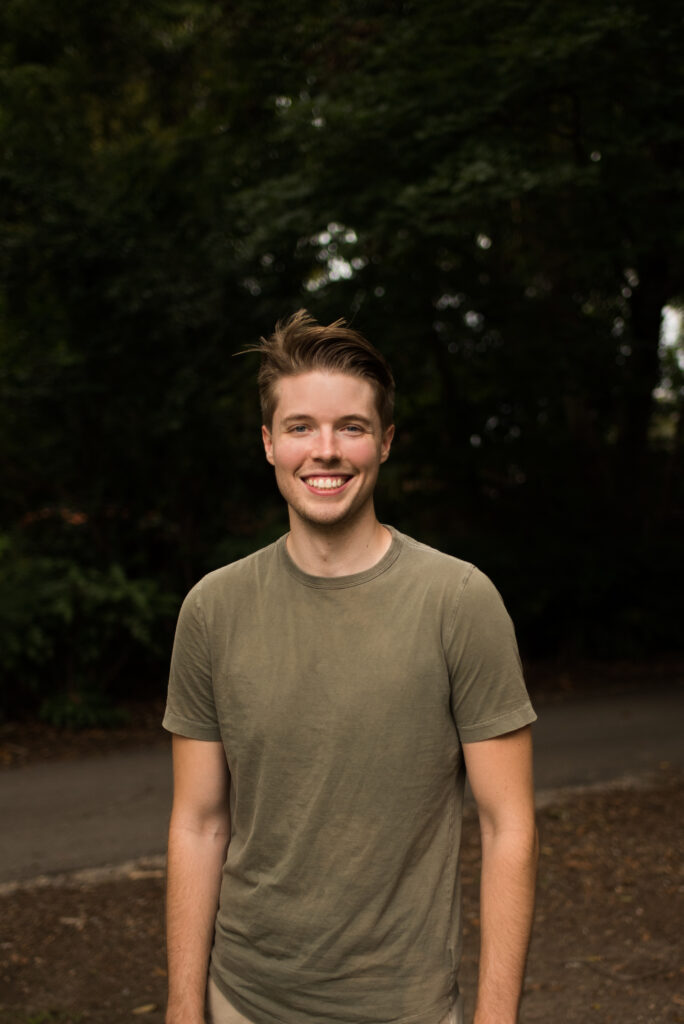Meet Dr. Brown!
After a mere three weeks to settle in as the newest Biotechnology Program’s postdoc, Dr. Phillip Brown received an email from me hoping to interview him. I was particularly excited about this interview since I recognized his name from a BioLunch presentation over the summer when he was a graduate student, indicating that this must be his first position since earning his Ph.D.

Dr. Brown started here at NC State with his undergraduate degree in Biological Sciences. He pursued the Molecular, Cellular, and Developmental (MCD) concentration as well as the Biotechnology minor, both of which have learning experience/research requirements. He mentioned how he was recommended a list of professors to contact for a research position, but only one responded – Dr. Kathariou, a professor and principal investigator (PI) in Food Science Microbiology. In her lab, he not only fulfilled his research requirement, but also discovered his interest in microbiology.
Once he earned his B.S., Dr. Brown landed a position with the Environmental Protection Agency (EPA) studying anthrax and bioterrorism. Although this sounds like a super cool project, he shared how his experience in government encouraged him to pursue a higher degree. “The work just wasn’t for me. It was a lot of doing the same things over and over again every day, and that’s kind of where I learned that if I want to have more of an intellectual challenge where I’m the one asking the questions, I needed to go back to grad school,” he explained.
He returned to Dr. Kathariou’s lab for his graduate degrees in Microbiology. In food science, it is customary for students to earn a Master’s degree first, so that is what Dr. Brown did. “Before I even finished my master’s I knew I wanted to continue [my work],” he said. His project focused on targeting the genes involved in Listeria’s resistance to bacteriophages. He hopes to base his future BIT module on this, including having students use CRISPR to knock out bacterial genes, so be on the lookout for that class next spring!
“I’ve come here [to the BIT Program] and I’ve learned that, just like scientific research, there’s education research.”
-Dr. Phillip Brown
Like many graduate students, Dr. Brown found his love of teaching through being a teaching assistant (TA) for undergraduate microbiology courses. “When I would go into my research lab, there were days I wasn’t happy to be there… But I never had a day where I showed up and at the end of the day felt like I didn’t want to continue teaching,” he said about why he felt teaching was the path he wanted to take. Most graduate school programs require students to TA for at least one semester. The catch to this is that no one gives a lecture on how to teach or run a lab full of students. Dr. Brown said, “I’ve come here [to the BIT Program] and I’ve learned that, just like scientific research, there’s education research,” and commented on how the BIT faculty are at the intersection of both.
Having this position will not be the first time Dr. Brown has benefited from being in the BIT Program. Earning the BIT minor as an undergrad was one of two things (the other being his research experience) that really helped him get back on track after a not-so-great first few semesters. “BIT 410/510 paired with my research and showed me why I was in the classes I was in… I came to the BIT Program, and they were much more clear on what I was going to be using this [lecture] information for and how I was going to be applying it,” he said about his undergraduate BIT experience.
Dr. Brown said the most common question he gets asked by students is what he thinks they should do next. He explained to me that the issue with this question is students are always asking people who work in academia what they should do, and 90% of the time, they will tell you to get a Ph.D. and work in a research lab. “I’ve seen a lot of people that go into academia, or they go into med school or vet school because that’s what they’re ‘supposed to do,’ because that’s what their parent or professor or mentor told them they should do. You need to pick what YOU want to do,” he said. Even if you don’t know what that is yet, there is lots of time and many options so don’t be afraid to try anything–even Dr. Brown took a detour before he found where he wanted his career to go.